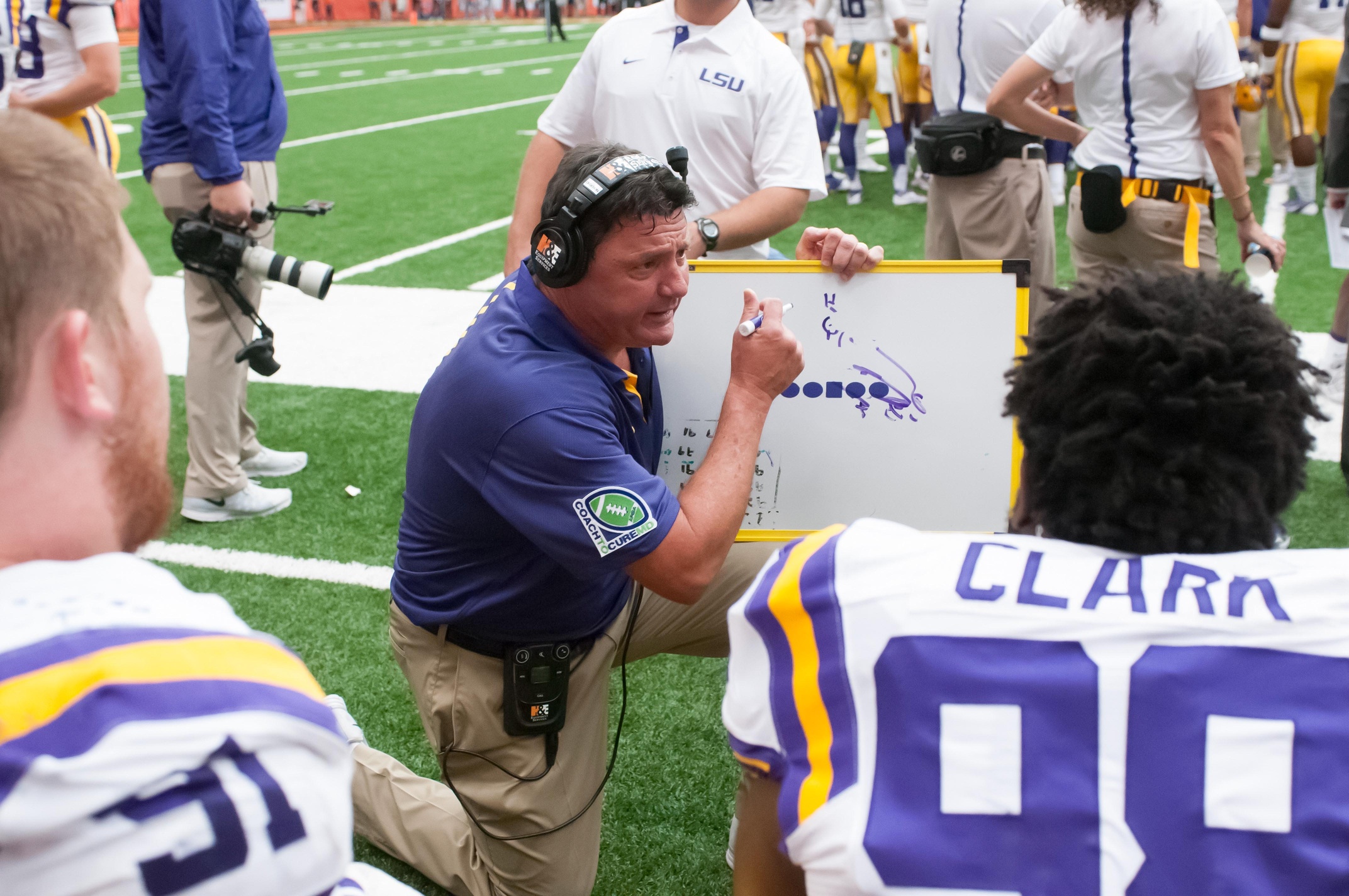Miles Miracle?: How the (not so) Mad Hatter regained his mojo
By Gary Laney
Published:
It’s easy sometimes to think that things are spiraling out of Les Miles’ control at LSU.
There was the averted disaster in that 2010 Tennessee game where Miles’ team didn’t manage the clock. Was Miles in control there? How about the mismanaged clock at Ole Miss the year before? There’s the losing streak against Alabama he seems powerless to stop.
With those kinds of outcomes in his past, LSU’s 2015 season, and possibly Miles’ tenure, seemed to be going down the tubes with an ugly three-game losing streak. It was easy to imagine that Miles was no longer in control and the clock, like the clock at the end of the infamous Tennessee game, was about to run out on his career.
But if we stay with that analogy, then that makes the LSU administration like Tennessee, because it botched the firing of Miles much like Tennessee botched its defensive substitutions. And LSU’s late wins over Texas A&M and Texas Tech were like Stevan Ridley diving for the touchdown to break the Vols’ hearts.
And, to finish the thought, the next season, LSU went 13-1 and played for a national championship.
LSU fans would be happy for a similar outcome this year. And really, that’s the expectation. With 18 starters coming back, Miles’ 2016 Tigers are expected to return to the short list of contenders for the national title. And with the Tigers having had another banner recruiting class and earned praise with coaching hires, the winning streak hasn’t stopped.
How did Miles stare into the abyss of the Texas A&M week and get here, with the Tigers back among the nation’s elite, like the losing streak never happened?
Let’s break it down, starting with debunking a myth.
Miles played it better than his bosses
If you think Miles wasn’t fully in control as the season unwound, listen to the logic of Jim Kleinpeter, the longtime LSU beat writer from the New Orleans Times-Picayune/nola.com.
“Something happened that week (when LSU decided to keep Miles) where LSU committed to Miles,” Kleinpeter said. “You don’t sign coaches to three-year deals if there’s not a commitment.”

The situation went from one where Miles was reported to be heading out the door to one where he was hiring away a big-name coach, from a good program, in David Aranda of Wisconsin (along with extensions for other assistants). Good coaches at strong programs don’t leave to coach for a guy who they see as being on the hot seat, or a lame duck.
Aranda had to believe that a Miles staff wasn’t likely to be shown the door soon.
So this wasn’t Miles surviving that week, it was Miles winning a power play. He finished the year with the clout to make big hires. That kind of sets the tone for things to move forward.
Miles kept the focus on the right places
One way for things to spiral out of control is for the focus to shift to the wrong things. That didn’t happen, Tigers offensive guard Will Clapp said, recalling the (job saving?) Texas A&M game.
“He told us not to win for him,” Clapp said, “but to play for each other.”
If Miles and his off-field team were working on saving his job, he did his part on keeping the players paying attention on just winning games.
“We didn’t listen to all the noise on the outside,” Clapp said.
So as bad as things got in the three-game losing streak, things stayed focused enough for the ship to get righted. The blowout of Texas Tech in the bowl game was the embattled offense’s best game of the year.
“The Texas Tech game was definitely something we can build on going into next season,” quarterback Brandon Harris said.
You don’t get that kind of performance if you let your team’s focus shift away from just winning football games to the uncertainty around the coach.
Miles continues to recruit well
No, LSU didn’t finish with the nation’s top-rated recruiting class, but even with the uncertainty around Miles plus the departure of recruiting coordinator Frank Wilson (now the head coach at Texas-San Antonio), LSU still landed the nation’s No. 3 recruiting class.
How? It helps that LSU is in a prospect-rich state. But it also helps that Miles fills his staff with great recruiters.

When Wilson left, defensive line coach Ed Orgeron, long considered one of the premier recruiters in college football, stepped into the void.
“If there’s anybody who can replace Frank Wilson, it’s Ed Orgeron,” Kleinpeter said.
Miles hit another home run when he hired Jabbar Juluke to replace Wilson as runnings back coach. A family friend of LSU star Leonard Fournette, Juluke, like Wilson, is a former New Orleans high school coach who should be able to recruit the prospect-rich city in much the same way Wilson did.
He’s a good enough replica of the man he replaced that the Baton Rouge Advocate dubbed him “Frank Wilson 2.o.”
Speaking of good hires…
Hiring coaches has never been a weakness for Miles.
“Really the only bad decision he’s made with coaches was when he went with co-defensive coordinators (in 2008),” Kleinpeter noted. “He’s always been good about hiring good coaches.”
This off-season is no exception. With the hiring of Aranda, the Tigers are able to more than offset the surprising loss of Kevin Steele to Auburn. There’s nothing like stealing a successful coordinator from another big-time program to help build off-season momentum.
Miles also adjusts
So far, we’ve touched on areas where Miles consistently excels — hiring coaches and recruiting. But something Miles also does well is change.
Sure, he gets criticized for NOT changing the Tigers’ putrid pass offense (something he swears to be doing this year), but there have been a couple of notable changes this year that could result in better outcomes going forward for the Tigers.
The first is the bucking of the trend of players leaving early for the NFL. With stars like linebacker Kendell Beckwith, center Ethan Pocic, defensive tackle Christian LaCouture and cornerback Tre’Davious White all returning for their senior seasons, the outlook for the Tigers improved significantly.
Since 2011, LSU was losing juniors to the draft more than any program in the country and perhaps faster than the program could handle. This year, it seemed like players were getting different feedback. All four of the above-mentioned players likely would have at least received NFL paychecks. Instead, they are locker room leaders in Baton Rouge.

“It helps to have people who have been there,” said Beckwith, who has been around long enough to have played for three defensive coordinators. “You just have more experience.”
And maybe a team with a different personality with leaders like Beckwith, who has been around so many schemes, he joked that “I’m going to have quite a resume in understanding defenses.”
Another place where Miles has been willing to change is with coaches responsibilities. For the bowl game, Cameron moved from the press box to the field, where he could have more personal interaction with Harris.
“I loved it,” Harris said. “I pray to God that Cam stays on the sideline.”
It’s not madness
Did Miles get lucky at the end of that 2010 Tennessee game? Sure, because he had no control on how Tennessee substituted its defensive players and if the Vols had done it correctly, they would have won. Did Miles similarly get lucky not to get fired this year?
Again, the answer has to be yes. If those who wanted Miles out followed the Georgia blueprint — quick and dirty, as opposed to leaked and messy, allowing sympathy to build for the coach — Miles would be gone today.
But give Miles credit. He handled the mishandling well. And he’s winning the off-season not because he’s a grass-chewing, Mad Hatter who slicks out of jams in comic fashion, but because he does things well.
It’s not really madness. But there is a method.






